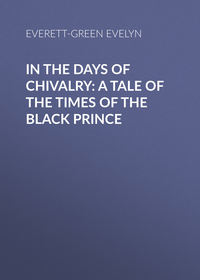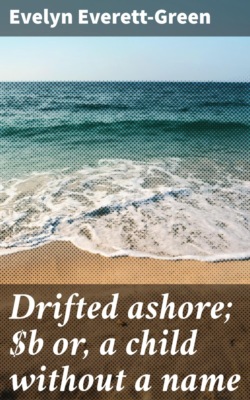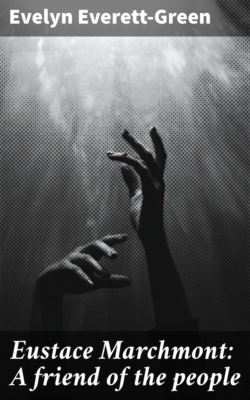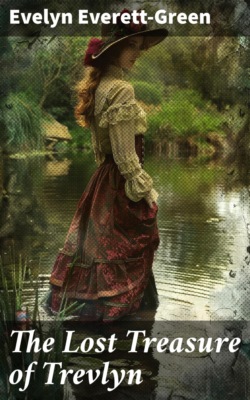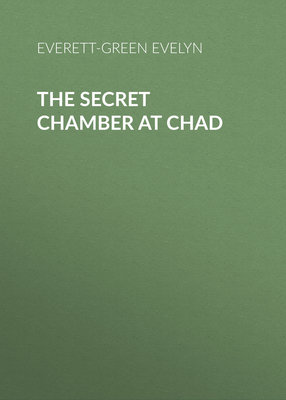Kitabı oku: «In the Days of Chivalry: A Tale of the Times of the Black Prince», sayfa 5
CHAPTER V. THE KING AND THE PRINCE
King Edward's assembly of knights that met at his first Round Table was as typical a gathering as could well have been found of that age of warlike chivalry. The King's idea was likewise typical of the age he lived in. He had begun to see something of that decline of chivalry which was the natural outcome of a real advance in general civilization, and of increasing law and order, however slow its progress might be. Greatly deploring any decay in a system so much beloved and cherished by knights and warriors, and not seeing that its light might merely be paling in the rise of something more truly bright and beneficent, the King resolved to do everything in his power to give an impetus to all chivalrous undertakings by assembling together his knights after the fashion of the great King Arthur, and with them to take counsel how the ways and usages of chivalry might best be preserved, the old spirit kept alive, and the interests of piety and religion (with which it should ever be blended) be truly considered.
How far this festival succeeded in its object can scarcely be told now. The days of chivalry (in the old acceptation of the term) were drawing to a close, and an attempt to galvanize into life a decaying institution is seldom attended with any but very moderate success. From the fact that we hear so little of the King's Round Table, and from the few times it ever met, one is led to conclude that the results were small and disappointing. But the brilliance of the first assembly cannot be doubted; and for the twins of Gascony it was a wonderful day, and marked an epoch in their lives; for on that occasion they saw for the first time the mighty King, whose name had been familiar to them from childhood, and had actual speech with the Prince of Wales, that hero of so many battlefields, known to history as the Black Prince.
So great was the crowd of esquires who waited upon the knights sitting around the huge Round Table, that the Gascon brothers only struggled for a few minutes into the gay assemblage to look at what was going on there. The table was itself a curiosity – a huge ring round which, in beautifully carved seats, the knights sat, each seat fitting into the next, with an arm to divide them, the backs forming a complete circle round the table. The King's seat was adorned with a richer carving, and had a higher back, than the others, but that was its only distinction. Within the circle of the table were pages flitting about, attending on the guests; and the esquires who thronged the corridors or supplemented the attentions of the pages were considerably more numerous than the occasion required, so that these were to be seen gathering in groups here and there about the building in the vicinity of the feast, discussing the proceedings or talking of public or private matters.
Very wonderful was all this to Gaston and Raymond, but not quite so bewildering as it would have been a month ago. They had been about the Court some little time now, and were growing used to the fine dresses, the English ways of speech, and the manners and customs which had perplexed them not a little at first. They were greatly entertained by watching the shifting throng of courtiers, and their one glimpse at the royal countenance of the King had been fraught with keen pleasure and satisfaction; but so far as they knew it, they had not yet seen the Prince of Wales, and they had not caught sight either of their cousins Oliver or Bernard, though they had found John sitting in the embrasure of a window in the corridor, watching the scene with the same interest which they felt in it themselves.
When they saw him they joined him, and asked the names of some of the gay personages flitting about. John good-naturedly amused them with a number of anecdotes of the Court; and as the three were thus chatting together, they were suddenly joined by another group of three, who advanced along the corridor talking in low tones but with eager excitement.
"Here comes the Prince," said John, rising to his feet, and the twin brothers turned eagerly round.
They knew in an instant which of the three was the Prince, for his companions were John's two brothers, Oliver and Bernard. Young Edward was at that time not quite fourteen, but so strong, so upright, so well grown, and of such a kingly presence, that it was hard to believe he had scarcely left his childhood behind. His tunic was of cloth of gold, with the royal arms embroidered upon it. He wore a golden collar round his neck, and his golden girdle held a dagger with a richly-jewelled hilt. A short velvet mantle lined with ermine hung over his shoulder, and was fastened by a clasp richly chased and set with rubies. His face was flushed as if with some great purpose, and his eyes shone brightly with excitement.
"It shall never be true – I will not believe it!" he was saying, in urgent accents. "Let chivalry once die out, and so goes England's glory. May I die ere I live to see that day! Better a thousand times death in some glorious warfare, in some knightly deed of daring, than to drag out a life of ease and sloth with the dying records of the glorious past alone to cheer and sustain one. Good John, thou art a man of letters – thou canst read the signs of the times – prithee tell me that there be no truth in this dark whisper. Sure the days of chivalry are not half lived through yet!"
"Nor will be so long as you are spared to England, gentle Prince," answered John, with his slight peculiar smile. "You and your royal Sire together will keep alive the old chivalry at which was dealt so sore a blow in your grandsire's days. A reign like that of weakness and folly and treachery leaves its mark behind; but England's chivalry has lived through it – "
"Ay, and she shall awake to new and fuller life!" cried the ardent boy. "What use in being born a prince if something cannot thus be done to restore what has been lost? And why should princes stand idle when the world is all in arms? Comrades, do ye long as I do to show the world that though we have not yet won our knighthood's spurs, we are yet ready and willing to sally forth, even as did the knights of old, upon some quest of peril or adventure? Why is it that I, who should by rights be one to show what may be done by a boy's arm with a stout heart behind, am ever held back from peril and danger, have never seen fighting save in the tilt yard, or wound worse than what splintered spear may chance to inflict? I burn to show the world what a band of youths can do who go forth alone on some errand of true chivalry. Comrades, give me your ears. Let me speak to you of the purpose in my heart. This day has my father, in the hearing of all men, lamented the wane of chivalry, has spoken brave words of encouragement to those who will strive with him to let it be no hollow name amongst us. Then who more fit than his own son to go forth now – at once, by stealth if need be – upon such a quest of peril and glory? nay, not for the glory – that may or may not be ours – but upon a mission of chivalrous service to the weak and helpless? This thing I purpose to do myself, together with some few chosen comrades. Brothers of Brocas, will ye go with me?"
"We will! we will!" cried the three brothers in a breath.
"We will!" echoed the twins of Gascony, forgetting all but their eager desire to share the peril and the glory of the Prince's enterprise, whatever it might be.
Young Edward heard the sound of the strange voices, and turned a quick glance of inquiry upon the youths. He saw that they wore the livery of Sir James Audley, who was a great favourite even then with the Prince. The true kingly courtesy of the Plantagenets was ingrained in the nature of this princely boy, and he looked with a smile at the two eager faces before him.
"And who be ye, fair gentlemen?" he asked. "Methinks the badge you wear is answer almost enough. I know your good lord well, and love him well, and sure there be none of his esquires, be they never so young, who would disgrace their master by fleeing in an hour of peril. Wherefore if ye would fain be of the band I seek to muster round me, I will bid you ready welcome. I seek none that be above twenty years of age.
"Good John, you shall be the wise man of our party. These lads have not lived many more years than I have myself, or I am much mistaken."
"We are twin brothers," said Gaston frankly, "and we are nigh upon sixteen. We have been with Sir James a matter of two months. We – "
"They met him in the woods of Gascony," cried Oliver, "and rescued him from the attacks of a pack of fierce wolves. I trow they would bear themselves bravely be your quest what it may."
"Are you Gascons?" asked the Prince, looking with keener interest at the two youths; for he shared some of his father's instincts of government, and was always well disposed towards Gascon subjects.
"We are half Gascon and half English, may it please you, fair Prince," answered Gaston readily, "and we will follow you to the death."
"I well believe it, my good comrades," answered the Prince quickly; "and right glad shall we be of your company and assistance. For our errand lies amidst dark forests with their hidden perils and dangers, and I wot that none know better what such dangers are nor how they may be escaped than our brethren of Gascony."
"Then you know on what quest we are bent, sweet Prince?"
Edward nodded his head as he looked over his shoulder. "Ay, that I do right well, and that will I tell you incontinently if no eavesdroppers be about. Ye know that of late days brave knights and gentlemen have been mustering to our Court from all parts of this land? Now amongst these is one Sir Hugh Vavasour, who comes from his house of Woodcrych, not half a day's ride from our Royal Palace of Guildford; and with him he has brought his son, one Alexander, with whom I yestere'en fell into converse. I say not that I liked the youth himself. He seemed to me something over bold, yet lacking in those graces of chivalry that are so dear to us. Still it was in talking with him that I heard this thing which has set my blood boiling in my veins."
"What thing is that, fair Prince?" asked John.
And then the young Edward told his tale. It was such a tale as was only too often heard in olden days, though it did not always reach the ears of royalty. The long and expensive, and as yet somewhat fruitless, wars in which Edward had been engaged almost ever since he came to the throne, had greatly impoverished his subjects, and with poverty there arose those other evils inseparable from general distress – robbery, freebooting, crime in its darkest and ugliest aspects; bands of hungry men, ruined and beggared, partly perhaps through misfortune, but partly through their own fault, wandering about the country ravaging and robbing, leaving desolation behind them, and too often, if opposed, committing acts of brutal cruelty upon defenceless victims, as a warning to others.
A band such as this was just now scouring the woods around Guildford. Young Vavasour had heard of depredations committed close against the walls of his own home, and had heard of many outrages which had been suffered by the poor folks around. Cattle had been driven off, their hardly-gathered fuel had vanished in the night; sometimes lonely houses were attacked, and the miserable inhabitants, if they offered resistance, stabbed to the heart by the marauders. One or two girls had been missed from their homes, and were said to have fallen a prey to the robber band. All these things, and the latter item especially, stirred the hot blood in the young Prince's veins, and he was all on fire to do some doughty deed that should at once exterminate such evildoers from the face of the earth, strike terror into the hearts of other bands, and show that the spirit of chivalry was yet alive in the kingdom, and that the King's son was the first to fly to the succour of the distressed and the feeble.
"For I will go myself and hunt these miscreants as though they were dogs or wolves – beasts of prey that needs must be put down with a strong hand. I will not tell my father the tale, else might he appoint warriors of his own to see to the matter, and the glory be theirs and not ours. No, this is a matter for my arm to settle. I will collect around me a band of our bravest youths – they shall all be youths like myself. Our good John knows well the country around our Palace of Guildford – in truth I know it indifferently well myself. We will sally forth together – my father will grant me leave to go thither with a body of youths of my own choosing – and thence we will scour the forests, scatter or slay these vile disturbers of the peace, restore the lost maidens to their homes, and make recompense to our poor subjects for all they have suffered at their hands."
It was just the scheme to fascinate the imagination and fire the ardour of a number of high-spirited and generous boys. The proximity of the Royal Palace of Guildford gave them every facility for carrying out the plan speedily and yet secretly, and the Prince had quickly enlisted a score of well-trained, well-equipped lads to follow him on his chivalrous quest. Sir James gave ready consent to his petition that the Gascon twins might join his train for a few days. The King, when he gave his sanction to the proposed expedition to Guildford, believed that his son was going there bent on sport or some boyish pastime, and scarce bestowed a second thought upon the matter. The royal children had each their own attendants and establishment, following wherever their youthful master or mistress went; and to the eldest son of the King a very decided liberty was given, of which his father had never yet had cause to repent.
Thus it came about that three days after the King's great feast of the Round Table had ended, the Prince of Wales, with a following of twenty young comrades, in addition to his ordinary staff of attendants, rode forth from the Castle of Windsor in the tardy winter's dawn, and before night had fallen the gay and gallant little band had reached the Palace of Guildford, which had received due notice of the approach of the King's son. Those who were sharp-eyed amongst the spectators of this departure might have noted that the Prince and his immediate followers each wore round his arm a band of black ribbon with a device embroidered upon it. The device was an eagle worked in gold, and was supposed to be emblematic of the swiftness and the strength that were to characterize the expedition of the Prince, when he should swoop down upon the dastardly foes, and force them to yield up their ill-gotten gains. These badges had been worked by the clever fingers of Edward's sisters, the youthful princesses Isabella and Joanna. Joanna, as the wardrobe rolls of the period show, was a most industrious little maiden with her needle, and must have spent the best part of her time in her favourite pastime of embroidery, judging by the amount of silk and other material required by her for her own private use. Both the sisters were devotedly attached to their handsome brother, and were the sharers of his confidences. They knew all about this secret expedition, and sympathized most fully with it. It was Joanna's ready wit which had suggested the idea of the badge, which idea was eagerly caught up by Edward; for to go forth with a token woven by the fair hands of ladies would give to the exploit a spice of romantic chivalry that would certainly add to its zest. So for the past three days the royal sisters had been plying their needles with the utmost diligence, and each of the gallant little band knew that he wore upon his arm a token embroidered for him by the hands of a youthful princess.
Of the Royal Palace of Guildford nothing now remains – even the site is not known with any certainty, though it is supposed to have occupied the spot where Guildford Park farm now stands. Its extensive park covered a large area of ground, and was a favoured hunting ground for many of the illustrious Plantagenets.
It need hardly be said with what interest and curiosity the twin brothers gazed about them as they neared the little town of Guildford, where their uncle, Master Bernard de Brocas, possessed a gradually increasing property. They felt that this journey was the first step towards Basildene; and utterly ignorant as they were of its exact locality, they wondered if they might not be passing it by whenever some ancient Manor House reared its chimneys or gables above the bare encircling trees, and their hearts beat high at the thought that they were drawing near to their own lost inheritance.
The Palace was warmly lighted in honour of the arrival of the Prince of Wales; and as the little cavalcade dismounted at the door and entered the noble hall, a figure, habited after the fashion of the ecclesiastics of the day, stepped forth to greet the scion of royalty, and the twin brothers heard their comrades mutter,
"It is the good Rector, Master Bernard de Brocas."
The young Prince plainly knew the Rector well, and after just bending his knee to ask the blessing, as was his reverent custom, he led him into the banqueting hall, where a goodly meal lay spread, placing him in a seat at his own right hand, and asking him many things as the meal progressed, leading the talk deftly to the robbers' raids, and seeking, without betraying his purpose, to find out where these miscreants might most readily be found.
The good Rector had heard much about them, but knew little enough of their movements. One day they were heard of in one place, and again they would vanish, and no man would know whither they had gone till they appeared in another. Everywhere they left behind them desolated homes, and bloodshed and ruin followed in their track. Master Bernard had heard too many such tales from all parts of the kingdom to heed overmuch what went on in this particular spot. He knew that the winter's privation and cold acted upon savage men almost as it did upon wolves and ravenous beasts, and that in a country harassed and overtaxed such things must needs be. He never suspected the cause of the Prince's eagerness. He believed that the youths had come down bent on sport, and that they would take far more interest in the news he had to give them, that a wild boar had recently been seen in the forest aisles of the Royal Park, and that the huntsmen would be ready to sally forth to slay it at a single word from the Prince.
Edward's eyes lighted at this. It seemed to him a fortunate coincidence. Also he would be glad enough to see the killing of the boar, though he was more interested in the expedition it would involve into the heart of the forest.
"Prithee give orders, good Master Bernard, that the huntsmen be ready tomorrow morning at dawn of day. I trow there be horses and to spare to mount us all, as our own beasts will be something weary from the journey they have taken today. We will be ready ere the sun is up, and if kind fortune smiles upon us, I trust I shall have the good fortune to have a pair of fine tusks to offer to my sisters when they join us here, as they shortly hope to do."
Master Bernard, who was a man of no small importance all through this neighbourhood, hastened away to give the needful orders. He had come from his own Rectory hard by to receive the Prince and his comrades, and he suspected that the King would be well pleased for him to remain beneath the roof of the castle so long as this gay and youthful party did so.
When night came and the youths sought the rooms which had been made ready for them, the Prince signed to a certain number of his comrades to repair with him to his chamber, as though he desired their services at his toilet. Amongst those thus summoned were the three sons of Sir John de Brocas, and also the Gascon twins, for whom young Edward appeared to have taken a great liking, and who on their part warmly returned this feeling. Shutting the door carefully, and making sure that none but friends were round him, the Prince unfolded his plan.
He had learned from the Master Huntsman, whom he had seen for a few minutes before going to his room, that the boar lay concealed for the most part in some thick underwood lying in the very heart of the forest many miles distant, right away to the southwest in the direction of Woodcrych. This part of the forest was fairly well known to the Prince from former hunting expeditions, and he and John both remembered well the hut of a lonely woodman that lay hidden in the very depths of the wood near this spot. It had occurred to Edward as likely that old Ralph would be better acquainted with the habits of the robbers than any other person could be. He was too poor to be made a mark for their rapacity, yet from his solitary life in the forest he might likely enough come across their tracks, and be able to point out their hiding places. Therefore the Prince's plan was that he and the picked companions he should choose should slip away from the main body of the huntsmen, and make their way to this lonely cabin, joining their comrades later when they had discovered all that they could do from the old man. The shouts of the huntsmen and the baying of the dogs would guide them to the scene of the chase, and if the rest who remained all the while with the foresters and the dogs missed the Prince from amongst their ranks, they were not to draw attention to the fact, but were rather to strive to conceal it from the Master Huntsman, who might grow uneasy if he found the young Edward missing. It was of importance that all inquiries respecting the robbers should be conducted with secrecy, for if the Prince's curiosity on the subject were once to be known, suspicion might be aroused, or a regular expedition against them organized, the glory and credit of which would not belong in anything but empty name to the Prince.
It was not, perhaps, unnatural that the six lads who had first conned over the plan together should be selected as the ones to make this preliminary inquiry. John was chosen for his seniority and the prudence of his counsels, his brothers for their bravery and fleetness of foot, and the Gascon twins for their close acquaintance with forest tracks, and their greater comprehension of the methods employed in following the trail of foes or fugitives through tangled woods. They would likely enough understand the old man's counsel better than any of the others; and as the sport of hunting the boar was more esteemed by the other youths than the expedition to the woodman's hut, no jealousy was aroused by the Prince's choice, and the scheme was quickly made known to the whole of the party.
The morrow proved a first-rate day for a hunting party in the forest. A light crisp snow lay on the ground, melting where exposed to the sun's rays, but forming a sparkling white carpet elsewhere. It was not deep enough to inconvenience either men or horses, and would scarce have fallen to any depth beneath the trees of the forest; but there was just sufficient to be an excellent guide in tracking down the quarry, and all felt confident that the wily old boar had seen his last sunrise.
Merrily rode the party forth through the great gateway and across the fine park in the direction of the forest. The Prince and his five chosen comrades rode together, sometimes speaking in low tones, sometimes joining in the gay converse on the subject of hunting which went on around them. But the Prince's thoughts were far less with sport than with the wrongs of his father's subjects, and the cruel outrages which they had suffered unredressed and almost unpitied. His heart burned within him to think that in merry England, as he liked to call it, and in the days of chivalry, such things were possible; and to put down cruelty and rapacity with a strong hand seemed of infinitely more importance to him than the pursuit of a fine sport.
Thus musing, and thus talking in low tones to the thoughtful John, the Prince dropped a little behind the muster of huntsmen. His chosen comrades followed his example, and straggled rather aimlessly after the main body, till at last a turn in the forest shut these completely from their view.
"Now," said the Prince, turning to his five selected comrades, "this, if I mistake not, is our road. We will soon see if we cannot get upon the track of the miscreants whom I am burning to punish and destroy!"
